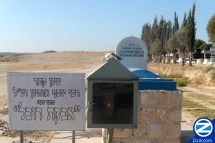Beeri HaNavi
From Zissil
(Difference between revisions)
| Line 6: | Line 6: | ||
|header3 = Hebrew: | |header3 = Hebrew: | ||
|data4 = בארי הנביא | |data4 = בארי הנביא | ||
| + | |header7 = Other Names: | ||
| + | |data8 = Beerah ben Baal | ||
|header7 = Spelling: | |header7 = Spelling: | ||
|data8 = Be'eri, Biari | |data8 = Be'eri, Biari | ||
| Line 13: | Line 15: | ||
|data14 = A prophet and Nasi of the tribe of Reuvan at the Time of the Assyrian exile, father of the prophet Hoshea.}} | |data14 = A prophet and Nasi of the tribe of Reuvan at the Time of the Assyrian exile, father of the prophet Hoshea.}} | ||
| − | '''Beeri HaNavi''' was the father of the prophet Hoshea. He himself was also a prophet and served as the Nasi of the Tribe of Reuvan at the time they were exiled by Tilglas Pileser, king of Assria. A small part of his prophesies were relevant for all future generations but were not enough justify the creation of their own book and was instead included as two verses in the Book of Yeshaya. | + | '''Beeri HaNavi''' was the father of the prophet Hoshea. He himself was also a prophet and served as the Nasi of the Tribe of Reuvan at the time they were exiled by Tilglas Pileser, king of Assria. A small part of his prophesies were relevant for all future generations but were not enough justify the creation of their own book and was instead included as two verses in the Book of Yeshaya, verses 19 and 20 of chapter 8. |
<gallery widths=180px heights=120px perrow=4 caption="Kever Be'eri Hanavi Photo Gallery"> | <gallery widths=180px heights=120px perrow=4 caption="Kever Be'eri Hanavi Photo Gallery"> | ||
Revision as of 19:16, 9 February 2013
Beeri HaNavi was the father of the prophet Hoshea. He himself was also a prophet and served as the Nasi of the Tribe of Reuvan at the time they were exiled by Tilglas Pileser, king of Assria. A small part of his prophesies were relevant for all future generations but were not enough justify the creation of their own book and was instead included as two verses in the Book of Yeshaya, verses 19 and 20 of chapter 8.
- Kever Be'eri Hanavi Photo Gallery


